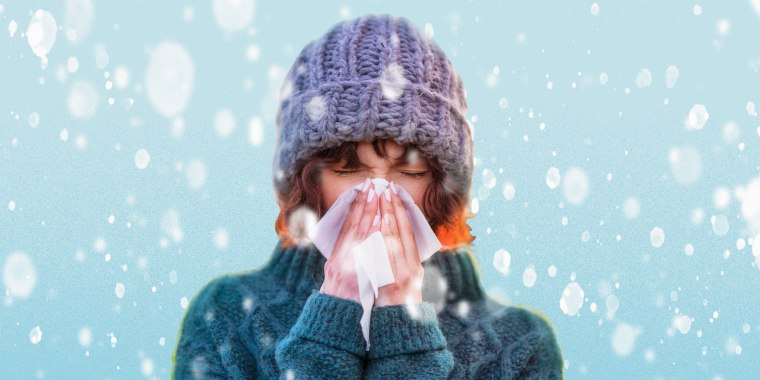This winter, there's a good chance that people will be spending more time than ever outdoors, given restrictions on indoor dining and gatherings related to COVID-19.
And, for much of the country, that means a lot of time spent out in the cold. That presents a tricky question: Won't that get us sick? The answer is no. It's an old wives' tale that you'll catch a cold if you go outside in the cold without a coat or hat. That said, there is a link between cold weather and viruses.
"We call it cold and flu season for good reason," said Dr. Benjamin Singer, a pulmonary and critical care specialist at Northwestern Memorial Hospital in Chicago. "Rhinoviruses, which are one of the main causes of the common cold, spike in late fall and early winter, and influenza historically spikes in mid-to-late winter — February, early March."
But it's not the cold itself to blame — not exactly, anyway.
"Respiratory viruses tend to spread much faster during the winter months, and a lot of it has to do not with the temperature, but with people being indoors and being in situations that are more conducive to the spread of the virus," said Dr. Daniel Griffin, an infectious disease expert for ProHEALTH in New York. "It's really the close quarters."
The holidays are a big factor: Griffin said spikes in viruses after Thanksgiving and Christmas are so predictable that doctors create their staffing schedules accordingly. And if they don't see a spike in flu cases then, they expect one to happen shortly after spring break in March and April, he said.
There may be other reasons people tend to get sicker when it's cold outside, though.
"We know the ultraviolet of the sun can help kill viruses, but in the winter, the days are shorter, the sun is not as high in the sky, so we have less of that," Griffin said.
People also tend to get less vitamin D in the winter, which affects immunity.
"We say, 'Oh, it doesn't take that much sunlight to get enough vitamin D' — just 15 minutes, completely naked, at the equator," Griffin said. "Nobody does that! When we go outside, we wear clothes, hats, sunscreen that blocks the ultraviolet that allows us to make vitamin D."
He pointed out that many Americans are vitamin D deficient, and while people should talk to their doctor about it, in general it's not a bad idea to take vitamin D supplements during the colder months.
The dryer air in the winter may be a problem, too. Research has shown that drops in humidity often precede flu outbreaks, according to the National Institutes of Health.
That said, while it's common to get a runny nose when you're out in the cold, that doesn't necessarily mean you're getting sick.
"It is absolutely true that exposure to cold air makes your nose run, but that's a normal reaction that our upper airway and the mucosal membranes in our nose have to cold weather," Singer said. "That's not the same thing as getting a viral infection. And once you get back into a warm and dry environment, that should go away."
While there's a known seasonality for the common cold and the influenza virus, it's not yet clear how winter will affect COVID-19, since the virus is relatively new and there isn't enough data.
That's why it's even more important that people continue to take precautions, experts say.
"We haven't seen much flu this year, and I think part of that is that people did a real good job of getting their flu vaccines this year, but I also think people learned a lot about how to keep themselves safe, and hopefully that will continue," Griffin said.

